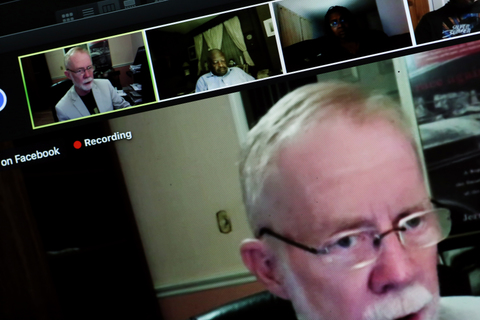In a single week, five people incarcerated in Mississippi jails have died at the hands of other inmates, the “PBS NewsHour” reported on Jan, 20. Jerry Mitchell, founder of the Mississippi Center for Investigative Reporting, joined William Brangham to discuss funding challenges, lack of oversight and inmate overcrowding. (video)
Threat of Infecting Rest of Us Only One Reason
“Just like you see these video footage of cops acting unethically and killing people unjustly, those are the same people that are arresting people, whose arrest reports are fueling prosecutions, and the same officers that are going on the stand testifying how they followed [these] procedures according to the law on the books,” said Lawrence Bartley, director of “News Inside,” a print publication of The Marshall Project that is distributed in hundreds of prisons and jails.
“But the incarcerated person, particularly the poor black kid, is sitting there saying, ‘No, that didn’t happen. . . . And of course they’re not going to believe this poor black kid, and that person is sentenced to 20 and 30 years . . . “
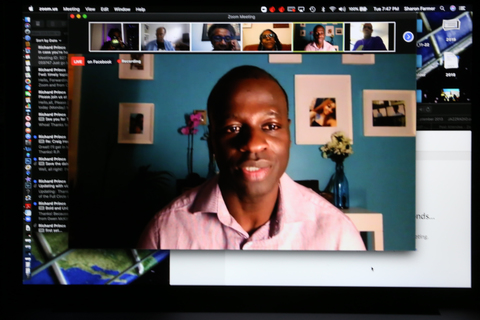
Yes, police departments lie. When George Floyd died after a white police officer kept his knee on Floyd’s neck for more than eight minutes, the Minneapolis Police Department issued a news release saying that Floyd died after a “medical incident.”
No question there are guilty people in prison. But what of those who are there because of police lies? Go to a prison, many of color will tell you, and it’s like seeing people from the old neighborhood.
The Marshall Project is a journalistic enterprise that focuses on criminal justice issues. Bartley was speaking Tuesday at the Journal-isms Roundtable, where the topic was prison journalism. Speakers agreed that prisons should be covered not only to hold these institutions accountable for their use of public funds, but because there are good stories to tell.
The roundtable took place by Zoom amid what attendee Jack White, retired Time magazine columnist, called “1968 on crack.”
In addition to the 27 people in and out of the Zoom call, which was our third, another 156 watched via our first Facebook Live broadcast.
You can watch via YouTube here.
We were three months into a COVID-19 pandemic that had most of us ordered to shelter in place, and a week into first peaceful, then violent reactions to yet another fatal police shooting of a black man, Floyd. That followed a white woman in New York’s Central Park calling the police on another black man, Christian Cooper, who had asked her to leash her dog. Both incidents had been caught on video.
Despite cities nationwide being set ablaze, journalists had to do their jobs. Many of us were exhausted. By Wednesday, more than 3,000 people had been arrested nationwide, according to an Associated Press tally. That number rose to more than 10,000 by Thursday.
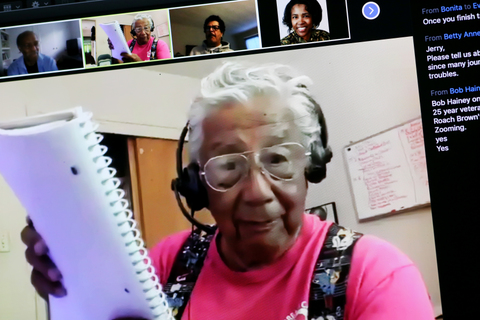
William Drummond, a journalism professor at the University of California-Berkeley, discussed his project on prison journalism. He helped San Quentin inmates produce their own newspaper, the subject of his new book, “Prison Truth: The Story of the San Quentin News.”
Drummond told of Kevin Sawyer, “who keeps meticulous notes of every book that he has read since he’s been in prison. That’s about 19 years now. There are 348 books now that he’s read since I saw him two months ago. But he annotates. He takes notes in a spiral [binder] you know, like this,” Drummond said, holding up a binder. “And when I don’t have anything to do, he brings his kind of Cliff’s Notes to the Media Center, and I scan, ’cause I don’t have to read all these books ’cause Kevin has gone through an annotated all of ’em.”
Jerry Mitchell, the veteran investigative reporter, is most well-known for cracking civil rights “cold cases,” but more recently has documented atrocities in Mississippi prisons. He recounted being allowed to sit in on an unauthorized conference call among prisoners at different institutions.
In addition, “I found out that the gangs were actually calling the mothers and extorting money from the mothers and guards and others — ‘If you don’t pay us, you won’t recognize your son.’ Or ‘pay us protection money or I’ll see to it he’s not protected. He’s going to get beaten or killed or whatever.’
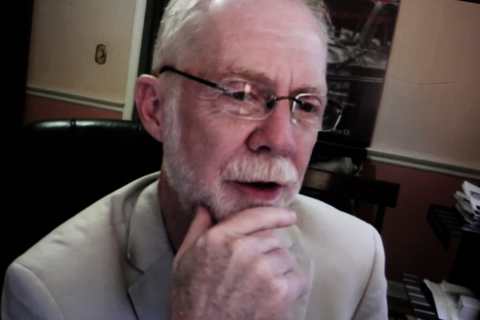
Mitchell led the story that resulted with the mothers, who went on the record talking about their sons. “You’re not leading with, ‘Oh, here’s the prison. You shouldn’t feel sorry for these people,’ but more like, who’s not going to empathize with the mother? . . .
” You find angles, you find stories, like Mr. Drummond said, that help [readers] realize that we’re not that different from them, that as a person of faith, but for the grace of God go I. . . . We come from the exact same circumstances as them.”
Our speakers raised a more deadly reason to pay attention to our prisoners: COVID-19.
“When you have 2.2 million people in confinement with no PPE [personal protection equipment], no testing, no nothing, and you release even a small number of those people out into the wider society, the effect is going to reinfect the wider society,” Drummond said.
“I hear from incarcerated people from around the country on a daily basis,” said Bartley. “A lot of them feel, what’s going on with COVID, that as Mr. Drummond mentioned that they’re the last to get tested. They’re the last to get screened, they feel that they’re the last to get treatment. And staff comes in and out. And . . . incarcerated people can’t bring it in. Staff bring it in. Not saying that staff is doing it intentionally, but they bring it in nonetheless, and they take it out nonetheless. So whatever goes on in prison can cause future infections to spike in the wider community.”
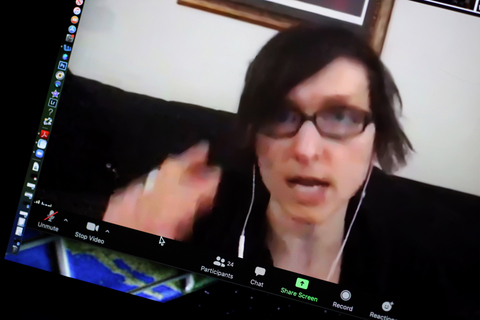
Keri Blakinger, another staff writer for the Marshall Project and its first formerly incarcerated reporter, added, “In Texas, there is absolutely no effort to decarcerate in the prison system because of COVID. . . . In Texas you can go to state prison for less than a gram of cocaine, so we’re not talking like these are serious violent offenses.”
On March 26, Attorney General William Barr directed Michael Carvajal, director of the Bureau of Prisons, to “prioritize the use of your various statutory authorities to grant home confinement for inmates seeking transfer in connection with the ongoing COVID-19 pandemic,” as Forbes reported.
But, according to Blakinger, “although there’s been some push after the Barr memo to incarcerate, BOP has fought tooth and nail, literally going into court opposing the release of people that have nonviolent crimes . . .
“I think there’s some ingrained belief that if we get rid of too many prisoners we won’t have as many jobs. But the truth is, they’re very understaffed. Maybe if they get rid of prisoners, they’d be able to do the existing jobs they have.”
Mitchell has reported on inmate-on-inmate killings in Mississippi prisons, and told us, “You have 300 cells that don’t have any working lights in them. . . . and of course you have no air conditioning, you have birds making nests in the broken windows, so in the middle of chilly winter . . . you know the people on the upper floors, they’re fine but the people on the first floor, they’re like freezing to death, wearing every piece of clothing they possibly have, and blankets, and anything else just to survive. . . . and of course rats and — I could go on and on and on. . . .”
But Mitchell added, “I think this goes beyond prisons, to a broader discussion. I believe people way beyond Mississippi think of those in prison as less than human. And if you’re being really, really honest, about what’s happening between police officers and people being killed, people of color being killed, or hurt, they see them as less than human. . . .
” ‘I am a police officer, he doesn’t feel like I am a police officer. I deserve to be treated better, and you’d better not talk back to me, and I’ve got authority to do whatever I want to you.. . .’ The officers, or guards, are paid almost nothing. And then, they’re working a gazillion hours . . . ’cause they don’t have enough staff, so they make ’em stay.
“It’s insanity. If people really knew what was happening in prison, they would be outraged just by what’s happening, and I think that’s part of our job as reporters to let them know.”
Support Journal-ismsFacebook users: “Like” “Richard Prince’s Journal-isms” on Facebook.
Follow Richard Prince on Twitter @princeeditor
Richard Prince’s Journal-isms originates from Washington. It began in print before most of us knew what the internet was, and it would like to be referred to as a “column.” Any views expressed in the column are those of the person or organization quoted and not those of any other entity. Send tips, comments and concerns to Richard Prince at journal-isms-owner@yahoogroups.com
View previous columns (after Feb. 13, 2016).
- Diversity’s Greatest Hits, 2018 (Jan. 4, 2019)
- Book Notes: Is Taking a Knee Really All That? (Dec. 20, 2018)
- Book Notes: Challenging ’45’ and Proudly Telling the Story (Dec. 18, 2018)
- Book Notes: Get Down With the Legends! (Dec. 11, 2018)
- Journalist Richard Prince w/Joe Madison (Sirius XM, April 18, 2018) (podcast)
- Richard Prince (journalist) (Wikipedia entry)
- February 2018 Podcast: Richard “Dick” Prince on the need for newsroom diversity (Gabriel Greschler, Student Press Law Center, Feb. 26, 2018)
- Diversity’s Greatest Hits, 2017 — Where Will They Take Us in the Year Ahead?
- Book Notes: Best Sellers, Uncovered Treasures, Overlooked History (Dec. 19, 2017)
- An advocate for diversity in the media is still pressing for representation, (Courtland Milloy, Washington Post, Nov. 28, 2017)
- Morgan Global Journalism Review: Journal-isms Journeys On (Aug. 31, 2017)
- Diversity’s Greatest Hits, 2016
- Book Notes: 16 Writers Dish About ‘Chelle,’ the First Lady
- Book Notes: From Coretta to Barack, and in Search of the Godfather
- Journal-isms’ Richard Prince Wants Your Ideas (FishbowlDC, Feb. 26, 2016)
- “JOURNAL-ISMS” IS LATEST TO BEAR BRUNT OF INDUSTRY’S ECONOMIC WOES (Feb. 19, 2016)
- Richard Prince with Charlayne Hunter-Gault,“PBS NewsHour,” “What stagnant diversity means for America’s newsrooms” (Dec. 15, 2015)
- Book Notes: Journalists Follow Their Passions
- Book Notes: Journalists Who Rocked Their World
- Book Notes: Hands Up! Read This!
- Book Notes: New Cosby Bio Looks Like a Best-Seller
- Journo-diversity advocate turns attention to Ezra Klein project (Erik Wemple, Washington Post, March 5, 2014)

